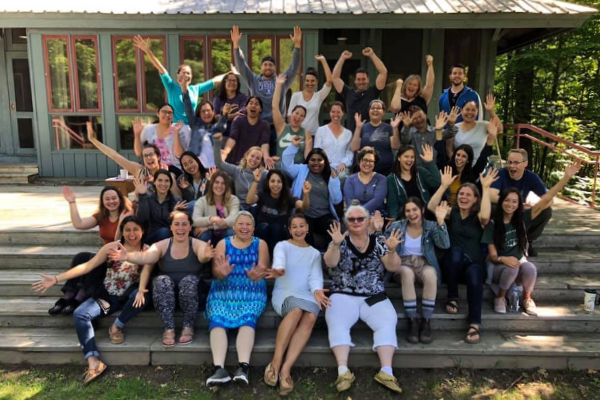Mentoring tomorrow’s Indigenous health experts
September 9, 2019
Share

The Queen’s University Biological Station (QUBS) is known as one of the premier scientific field stations in the country, and typically hosts researchers studying ecology, evolution, conservation, geography, and environmental science. Earlier this summer, it also became a place 25 Indigenous and non-Indigenous post-secondary trainees in Indigenous health research and professional programs gathered together to connect with the land, scholarly mentors, Indigenous knowledge keepers, and with each other during the 2019 Summer Institute.
The annual event, made available by the Indigenous Mentorship Network of Ontario (IMN-O), aims to support and grow the next generation of Indigenous health scholars and advance Indigenous health equity in the province.
“Health equity is one of the primary issues in Indigenous communities and with Indigenous peoples, and there is a great need to have expertly trained Indigenous health professionals for all facets of health in this country. The IMN-O provides training in all areas pertinent to upcoming scholars, researchers, and professionals,” says Kanonhsyonne (Janice Hill), Queen’s Associate Vice-Principal (Indigenous Initiatives and Reconciliation), who served as Elder for the occasion. “The inclusion of land-based and cultural knowledge was instrumental to the success of this year’s Summer Institute as it ensured a fulsome experience that some participants may not otherwise have opportunity to experience.”
In June, participants met on Anishinaabe land at QUBS for five days, during which time they engaged in research and career-building workshops, cultural and ceremonial activities, and connected with the land and water there. The group was comprised of undergraduate, master’s, and doctoral students from Queen’s, Trent University, University of Ottawa, Western University, Lakehead University, Laurentian University, McMaster University, and the University of Toronto – all representing various health disciplines.
Sunrise ceremonies were conducted each morning before participants attended expert sessions on grant writing, community-based participatory research, academic publishing, ethics, research training, and more. Throughout the week, participants engaged smudging ceremonies, a medicine walk, a full moon ceremony, sharing circles, and fire teachings, led by Kanonhsyonne and Knowledge Keeper Tim Yearington.
“Spending time on the land, in relation with the place and each other, and engaging in ways of being and knowing that don’t fit the conventional sense of the academy, were instrumental to the success of this year’s Summer Institute,” says Heather Castleden, Queen’s Associate Professor and Canada Research Chair in Reconciling Relations for Health, Environments, and Communities. “Connecting and learning from one another in these ways moves us toward decolonizing the structures wherein we study and work.”
The IMN-O is an interdisciplinary collaboration involving 13 research institutions in Ontario, and includes many of the province’s leading Indigenous health scholars and research centres. Dr. Castleden serves as one of the network’s principal investigators and was the Queen’s lead in organizing the Summer Institute, alongside Dr. Lucie Levesque and Dr. Mike Green, and their project coordinator and Queen’s master's student, Olivia Franks (ArtSci'19).
“All of the mentorship activities we included in this year’s Summer Institute were crafted with feedback we sought from students, faculty, and staff during the program’s application process,” says Franks. “It was important to design our program in respect to a spectrum of lived experiences and perspectives, so those attending would get exactly what they were looking for.”
Other Queen’s faculty and staff as well as Kingston community members who supported the institute activities were Dr. Karen Lawford, Vanessa McCourt, Helena Neveu, and Terri Ward. The planning and organizing group is now hard at work compiling feedback from the 2019 Summer Institute, with plans to build their learnings into future Indigenous mentorship opportunities for the Queen’s community. At their latest meeting, there was talk of seeking resources to establish an annual Summer Institute for Queen’s Indigenous health trainees. Natasha Stirrett (ArtSci'13, MA'15), a PhD candidate at Queen's, says mentorship has played a role in helping her navigate her educational and career paths as an Indigenous student and professional.
“Through my experience with the Summer Institute, I learned valuable tools and attained practical knowledge on applying for grants, community-based research, ethics in the academy, and how to navigate the hiring process for tenure-track positions,” says Stirrett, who has recently become a faculty lecturer at Carleton University. “I actually have applied a few of these teachings from IMN mentors in navigating my recently-acquired role as a tenure-tracked faculty member.”
Stirrett highlighted the traditional learnings shared at the Summer Institute as well.
“Having the opportunity to engage in traditional Indigenous ceremonies — a medicine walk and the unique experience of listening in and learning about men’s fire teachings with a knowledge keeper — was truly a highlight,” she says. “I am grateful for the experience.”
Funding and support of the 2019 Summer Institute was provided by Queen’s Office of the Vice-Principal (Research), Queen’s Faculty of Arts and Science, Queen’s Faculty of Health Sciences, Western University, University of Ottawa, and the Canadian Institutes of Health Research.
To learn more about the Summer Institute and the Indigenous Mentorship Network of Ontario, visit the website.